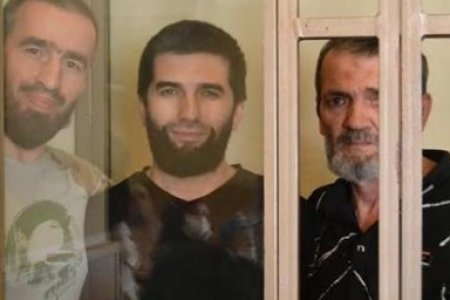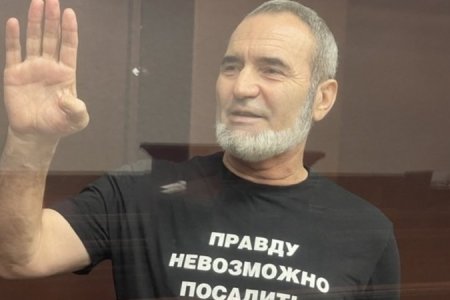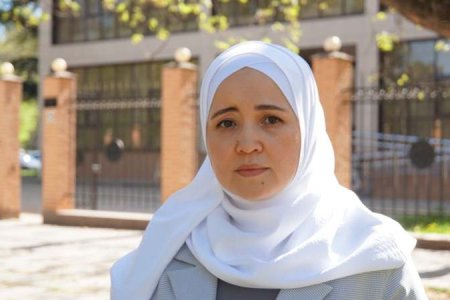
Abdullah Dzhapparov died on 25 February, aged just 13. He had spent the last five years without his father Aider Dzhapparov, a recognized Crimean Tatar political prisoner. Aider had been prevented from being with his family during Abdullah’s battle with cancer, and there is essentially no chance that Russia will show mercy and allow him to be present at his funeral.
Abdullah underwent an operation to remove a tumour back in March 2023, however the biopsy showed then that the cancer had spread. He had been receiving treatment in Turkey, but this, tragically, proved unable to save his life.
Like so many other children of political prisoners, Abdullah and his siblings were awoken on 10 June 2019 by armed and masked men bursting into their home and taking their father prisoner. From then on, Abdullah would have been forced to stand outside the ‘court’ in occupied Crimea hoping to at least catch a glimpse of his father being brought in for the latest detention hearing. Russia has used savage forms of intimidation and persecution to prevent families and friends from attending political trials or demonstrating solidarity with the political prisoners outside courts. Once the predetermined sentence has been passed, the appeal rejected, the regimes sends Crimean Tatar political prisoners thousands of kilometres from their families and homes in Crimea. Aider Dzhapparov is now in a prison, the harshest of Russia’s penal institutions in Chelyabinsk oblast.
Aider Dzhapparov (b. 1980) is a devout Muslim and was also active in visiting political trials of fellow believers under Russian occupation. He had long been targeted by the Russian FSB and was aware of surveillance for up to a year before his arrest.
Russia’s ‘operation’ on 10 June 2019 was carried out in different parts of Crimea with eight men seized, many of them civic activists who were likely targeted for their peaceful demonstration of solidarity with other political prisoners.
Aider Dzapparov ended up on ‘trial’ with two other men: Enver Omerov (b. 1961) and his son, Riza Omerov (b. 1988). Not one of the men was accused of any actual crime, with the charges based on discussions about the men’s Muslim faith and political topics, including Russia’s persecution of Muslims. Such discussions were claimed to be “anti-Russian” and “anti-constitutional”.
It was typical of the persecution that Russia has brought to occupied Crimea that one of the men, Enver Omerov, was seized as he was returning, together with his daughter, from yet another of these trials at the notorious Southern District Military Court in Rostov.
Russia is hiding behind a fatally flawed and probably political ruling from the Russian supreme court on 2003 to justify huge terms of imprisonment on ‘terrorism’ charges against men who have committed no crimes. In occupied Crimea, it is increasingly using such arrests and ‘trials’ as a weapon against the Crimean Tatar human rights movement.
Enver Omerov and Aider Dzhapparov were charged with ‘organizing’ an entirely unproven Hizb ut-Tahrir group (under Article 205.5 § 1 of Russia’s criminal code)., while Riza Omerov faced the lesser charge of ‘involvement’ in such a supposed group. Hizb ut-Tahrir is a peaceful, trans-national Muslim organization which is legal in Ukraine and most countries. Russia’s supreme court provided no grounds for its decision to label it ‘terrorist’, yet that decision (which was kept secret until it could no longer be challenged) is used to justify the above charges, as well as one of ‘planning violent seizure of power” (Article 278).
There was no evidence for any of this, with the case based on ‘assessments’ of three ‘kitchen chats’ on religious and political subjects’ produced by FSB-loyal ‘experts’. There were also two ‘secret witnesses’ who may never even have known the men they helped to imprison.
All of those involved in this case, from FSB ‘investigator’ Sergei Bosiyev; Russian prosecutors Yevgeny Koptilov and Dmitry Volkov, to the three judges: Roman Saprunov (presiding), together Rizvan Zubairov and Maxim Nikitin must have understood that both the charges and the alleged evidence were totally flawed. In 2021, on 12 January, a day marked in Ukraine since 1972 as the Day of the Ukrainian political prisoner, the court found all three men ‘guilty’. Enver Omerov was sentenced to 18 years; Aider Dzhapparov – to 17 years; and Riza Omerov – to 13 years. These were upheld on 10 March 2022 by the Russian court of appeal in Vlasikha (Moscow region).
Deepest sympathy to Abdullah’s family



